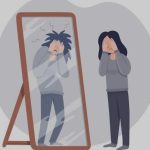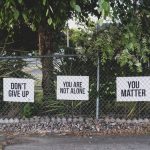Low self-esteem is a deeply rooted feeling of inadequacy, an ingrained sense that one is somehow not enough.
It’s a voice in the mind that whispers — sometimes shouts — messages of self-doubt, insecurity, and worthlessness.
At its core, low self-esteem is about a distorted self-image, one that belittles a person’s capabilities, value, and significance. For those who struggle with low self-esteem, life becomes a constant battle with this inner critic.
Over time, low self-esteem can shape relationships, alter how individuals perceive the world around them, and, unfortunately, make them more vulnerable to abuse.
Understanding the connection between low self-esteem and abuse requires a closer look at how self-worth affects one’s boundaries, choices, and behaviors in relationships. When people feel inherently unworthy, it often translates into an acceptance of mistreatment, criticism, and control by others, even when it’s harmful. It’s not that individuals with low self-esteem actively choose abuse; rather, they may not recognize the mistreatment as wrong, or they may feel powerless to stop it. Additionally, low self-esteem can even contribute to becoming an abuser, as a way to feel in control or valuable. To truly address the complexities of this issue, we must explore the different ways low self-esteem manifests and how it can fuel cycles of abuse — for both victims and perpetrators.
The Origins of Low Self-Esteem
Low self-esteem often has roots in childhood. People may develop it due to harsh criticism, neglect, or unrealistic expectations from parents, teachers, or peers. These early experiences can shape how a person views themselves and others. If a child grows up feeling that they’re “not good enough” or repeatedly told they’re a disappointment, they may internalize those beliefs. Over time, these thoughts harden into a core belief that they are inherently flawed or unlovable. This early conditioning isn’t easy to shake, and without intervention, these feelings of inadequacy can follow people into adulthood.
Media, societal standards, and cultural expectations also feed into low self-esteem. In a world that often values appearance, achievement, and social status, it’s easy to feel like we don’t measure up. For some, the comparison to others is constant, leading them to feel diminished, less capable, or less valuable. Social media, in particular, exacerbates this feeling by presenting idealized versions of others’ lives, pushing people with low self-esteem further into self-doubt.
How Low Self-Esteem Fuels Abuse
When someone doesn’t see their own worth, they are more likely to tolerate poor treatment. People with low self-esteem often believe they deserve negative treatment or that they are to blame when things go wrong. In relationships, this might mean accepting blame for issues they didn’t cause, staying in an unloving relationship, or making excuses for their partner’s mistreatment. The idea of deserving better may feel foreign or even impossible to imagine.
Low Self-Esteem as a Risk Factor for Victimization
Low self-esteem often lowers personal boundaries, making people more susceptible to manipulation and control. Abusers often seek out individuals who lack self-confidence or self-worth because they are easier to dominate and less likely to stand up for themselves. When someone feels they don’t deserve love or respect, they might stay in toxic relationships, assuming that mistreatment is simply what they have to accept. Fear of rejection or abandonment often keeps them in these situations, as they feel that no one else would want them or that they won’t find anything better.
Acceptance of Blame and Guilt
People with low self-esteem often take on excessive responsibility for problems, both within and outside of themselves. They may believe that if they were somehow “better” — more attractive, smarter, or less flawed — they wouldn’t be mistreated. This can lead to self-blame, where they rationalize or justify the abuser’s actions, thinking, “If I was a better partner, they wouldn’t be so angry.” This distorted thinking reinforces the abuse, creating a loop where they feel at fault and, therefore, powerless to change their circumstances.
Difficulty Setting Boundaries
Boundaries are essential in healthy relationships, but they require a sense of self-worth to enforce. People with low self-esteem struggle to set boundaries because they fear being disliked, judged, or abandoned. For them, saying “no” or expressing discomfort can feel like too great a risk, so they remain silent, even when something crosses a line. This leaves them vulnerable to mistreatment, as they are less likely to assert their own needs and limits. The result is often a pattern where they give more than they receive and feel drained, disrespected, and used.
Fear of Being Alone
When self-worth is low, the thought of being alone can be terrifying. A person with low self-esteem may cling to relationships — even abusive ones — out of fear that they won’t find anything better. They may view any relationship as better than none, fearing that being alone will confirm their worst fears about themselves. This desperation can make them settle for partners who belittle, control, or hurt them, convinced that no one else would want them.
Seeking Validation from Abusive Partners
Those with low self-esteem often look to others for validation, hoping external approval will fill the gap in their self-worth. Unfortunately, this need for validation can make them more susceptible to “love-bombing” — a tactic abusers use to win trust by showering their victims with affection and attention at first. When the abuse begins, they may cling to the hope that their partner will return to that affectionate stage if they just “try harder” or “prove” their love. This cycle of highs and lows traps them in the relationship, as they look to the abuser to validate their worth and feed their self-esteem, despite the pain.
Low Self-Esteem and the Role of Abusers
While low self-esteem often makes people vulnerable to abuse, it can also be a contributing factor for those who become abusers themselves. People who abuse others are frequently struggling with their own insecurities and may use control or intimidation to feel powerful or in control. Abusers may belittle or hurt others to boost their own sense of worth, seeing dominance as a way to mask their insecurities. In some cases, the abuse stems from a distorted attempt to protect their self-esteem, particularly if they fear abandonment, rejection, or disapproval.
Control as a Means of Validation
For some, asserting dominance over others is a way to affirm their own importance. Abusers with low self-esteem may feel threatened by a partner’s independence or achievements, interpreting them as a reflection of their own inadequacy. To compensate, they might belittle, criticize, or isolate their partner, believing that by “keeping them in line,” they are protecting their own self-worth.
Projection of Insecurities
Insecure individuals often project their negative feelings onto others. An abuser might criticize or demean their partner for traits they dislike in themselves or feel insecure about. This projection allows them to transfer their self-loathing outward, giving them temporary relief from their own feelings of inadequacy.
Fear of Abandonment
Some abusers act out of a deep fear of abandonment, rooted in their own low self-esteem. They might become overly controlling or abusive as a way to prevent a partner from leaving, convinced that they are unworthy of love and fearing rejection. In these cases, abusive behaviors are used to keep their partner dependent, as they believe they can’t survive alone.
Breaking the Cycle: Building Self-Esteem to Prevent Abuse
Addressing low self-esteem is essential for breaking the cycle of abuse. For victims, building self-esteem involves learning to recognize their own worth and assert their boundaries. Therapy, support groups, and self-help resources can help individuals explore and challenge their beliefs about themselves. Developing self-compassion is also critical; learning to silence the inner critic and replace negative self-talk with understanding and kindness can be transformative.
For those who struggle with abusive behaviors, therapy and self-reflection can help uncover and address their insecurities. Understanding their own worth apart from the control of others is essential. Abusers need to work on building a healthy sense of self-worth without resorting to destructive behaviors. Learning constructive communication, empathy, and emotional regulation can help break the cycle of abuse and foster healthier relationships.
Conclusion
Low self-esteem is more than a private battle with self-doubt; it’s a significant factor that can shape relationships, influence boundaries, and even fuel abusive cycles. For those who have low self-worth, the inner critic becomes a silent enabler of mistreatment, making it difficult to recognize, escape, or prevent abusive relationships. But by building a foundation of self-respect and self-compassion, both victims and abusers can disrupt these cycles, paving the way for healthier connections and a more positive self-image. True healing requires recognizing the value within and shedding the weight of perceived inadequacy, allowing individuals to move forward with strength and resilience.




0 Comments